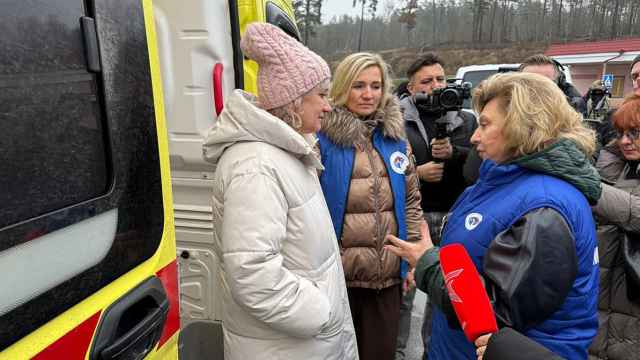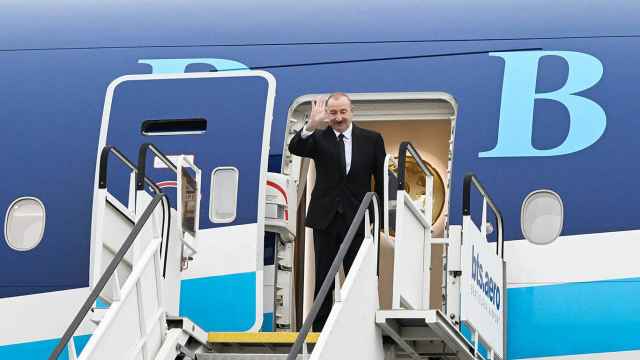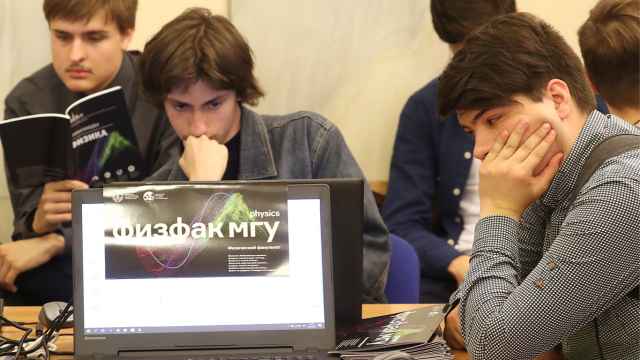The six men who successfully "traveled" to Mars without leaving downtown Moscow appeared healthy and in good spirits as they took the stage Tuesday to share their experience with the public.
The six — three Russians, two Europeans and a Chinese — pulled through a 520-day simulation mission called Mars500, designed to test the psychological viability of such travel.
The scientific data gathered during the project, which wrapped up Friday, is still being analyzed and will not be released before next April, researchers said at a news conference in Moscow.
The "marsonauts" themselves, however, were perfectly ready to appear in public, showing no outward signs of disorientation, fatigue or anxiety — instead smiling and laughing as they described the personal challenges they had overcome with a little help from their friends and teammates.
During their time sealed in four habitat modules and one external "Martian surface" — a total of 550 cubic meters — the men carried out more than 100 experiments designed to monitor their ability to navigate cultural and linguistic difficulties and cope with long-term separation from loved ones, with whom they could communicate only sporadically.
Similar experiments in the past have ended in disaster: A 420-day isolation experiment in 2000 ended in a fistfight and unwanted sexual advances, Reuters reported.
But if there were any slugfests during Mars500, the participants did not show it, and a photographic slide show created a hunky-dory impression of life in space: Here, the men assemble a cardboard Christmas tree and nativity scene. There, Diego Urbina injects conductive paste into electroencephalograph sensors on Wang Yue's head.
"The permanent topic of conversation was food. I couldn't eat it!" Wang told The Moscow Times. He said cultural differences were real, but stressed that these differences never led to conflict.
Participant Alexander Smoleyevsky told The Moscow Times that a busy schedule — between eight and 16 hours of experiments and exercises a day — helped distract participants from their sexual urges.
"Those who have flown with women say it's easier without them … there's no romantic entanglements," he said.
Americans did not participate in the project because nonproliferation laws restrict NASA's budget for international studies except in International Space Station missions, said Jeffrey Sutton, director of the nongovernmental National Space Biomedical Research Institute in Houston, Texas, who also attended Tuesday's conference.
At least three officials rewarded the participants with humble goodie bags, which came in addition to the 3 million ruble ($100,000) payments they are to receive for their participation.
Dr. David Dinges, a psychologist at the University of Pennsylvania, who designed one of the experiments for Mars500, was upbeat about the value of the mission.
"We got 4.5 million minutes of objective data. Now we're going to analyze it," he said.
The facility may now be used to model a trip to another planet, representatives of the Russian Institute for Biomedical Problems, which housed the simulation, said Tuesday. No prospective targets were named.
A Message from The Moscow Times:
Dear readers,
We are facing unprecedented challenges. Russia's Prosecutor General's Office has designated The Moscow Times as an "undesirable" organization, criminalizing our work and putting our staff at risk of prosecution. This follows our earlier unjust labeling as a "foreign agent."
These actions are direct attempts to silence independent journalism in Russia. The authorities claim our work "discredits the decisions of the Russian leadership." We see things differently: we strive to provide accurate, unbiased reporting on Russia.
We, the journalists of The Moscow Times, refuse to be silenced. But to continue our work, we need your help.
Your support, no matter how small, makes a world of difference. If you can, please support us monthly starting from just $2. It's quick to set up, and every contribution makes a significant impact.
By supporting The Moscow Times, you're defending open, independent journalism in the face of repression. Thank you for standing with us.
Remind me later.





